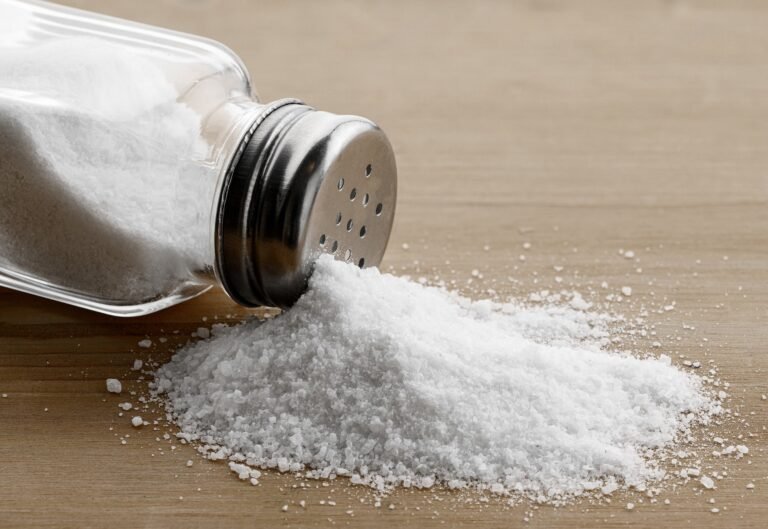In a recent study published in Gastric cancerresearchers investigated how often people in the UK add salt to their food at the table and how this relates to the risk of stomach cancer.
Study: The addition of salt to table food as a risk indicator of gastric cancer among adults: a prospective study. Image credit: Soho A Studio/Shutterstock.com
Record
Recent research has raised concerns about the increasing prevalence of stomach cancer among young people worldwide.
While researchers have associated dietary salt consumption with an increased incidence of gastric cancer in Asians, there are limited results from Western cultures from case-control studies.
Salt can damage the lining of the stomach, increasing its sensitivity to Helicobacter pylori colonization and increased risk of gastric cancer through mechanisms other than infection, such as damage to gastric epithelial cells by chemical carcinogens and N-nitroso molecules. Existing evidence on total or additional salt consumption has mixed results, which warrants further research.
About the study
In the present prospective study, researchers investigated the relationship between the addition of salt to table foods and the risk of stomach cancer.
The team used multivariable Cox regressions to assess the relationship between the frequency of added salt in food and the risk of developing stomach cancer among 471,144 people in the UK Biobank.
Subjects with a previous history of cancer or kidney disease and subjects with incomplete data on salt intake, urinary sodium or potassium levels, and body mass index (BMI) were excluded.
At first (between 2006 and 2010), the team used touchscreen surveys to determine how often participants incorporated salt into their meals. They used the ion-selective electrode method to assess urinary sodium, potassium, and creatinine levels in spot urine samples and INTERSALT equations to predict 24-hour urinary sodium excretion.
The researchers determined gastric cancer incidence based on linked national cancer registry data and International Classification of Diseases tenth revision (ICD-10) codes.
In addition, they examined the relationship between spot urine sodium and gastric cancer risk and the relationship between the frequencies with which participants added salt to meals and other indicators of sodium consumption (total sodium in diet and urine).
The team used Cox proportional hazard modeling to calculate hazard ratios (HR) for the analysis. Covariates in the study were age, body mass index (BMI), sex, ethnicity, educational level, Townsend index, smoking, diet, physical activity, alcohol intake, comorbidities, diuretic use, and Helicobacter pylori infection status.
In sensitivity analyses, the researchers excluded nonwhite subjects with comorbidities and H. pylori infections and the initial year of follow-up.
Results
In an average follow-up of 11 years, the researchers identified 640 cases of stomach cancer. People who add salt to meals at the table are more likely to be less educated, nonwhite men, former or current smokers, live in disadvantaged areas, and consume substantial amounts of alcohol (≥16.0 grams per day).
In multivariate analyses, the HR for risk of gastric cancer among people who usually add salt to their food at the table versus those who never or rarely do so was 1.4.
The researchers found a linear and positive relationship between estimated 24-hour urine sodium levels and the frequency of meals with salt. There were no significant relationships between 24-hour urinary sodium estimates and gastric cancer (HR, 1.2).
Sensitivity analyzes produced similar findings. There was no evidence of heterogeneity by cancer site, with an HR of 1.0 for 264 cardiac and 1.1 for 163 non-cardiac cases.
People who added salt to table foods never or rarely, sometimes, often, or always had urinary sodium levels of 2,932 mg, 3,028 mg, 3,129 mg, and 3,168 mg per day. Similarly, log-spot urinary sodium concentrations at the respective frequencies were 1.8, 1.8, 1.9, and 1.9 mmol/L.
The subjects’ frequency groups corresponded to 1,864 mg, 2,040 mg, 2,196 mg, and 2,254 mg of sodium consumed daily.
conclusions
The study found that adding salt to food at the table increases the risk of stomach cancer in UK adults. People who regularly included salt in their diet were 41.0% more likely to develop stomach cancer compared to those who rarely or never added salt.
The researchers also found a favorable dose-response relationship between spot urine sodium levels and 24-hour urinary sodium excretion.
However, examination of 24-hour urine salt as an exposure revealed no association with stomach cancer risk. After eliminating gastric cancer cases diagnosed in the initial year of follow-up, these associations were slightly stronger and showed reverse causality.
The findings are consistent with previous meta-analyses of prospective trials reporting higher risks of stomach cancer in Asian communities who consume a lot of salt, pickles, salted seafood and processed meat.
Further research with larger sample sizes is needed to assess possible variations between cancer subtypes and improve quantification of the association between salt intake and gastric cancer risk.
